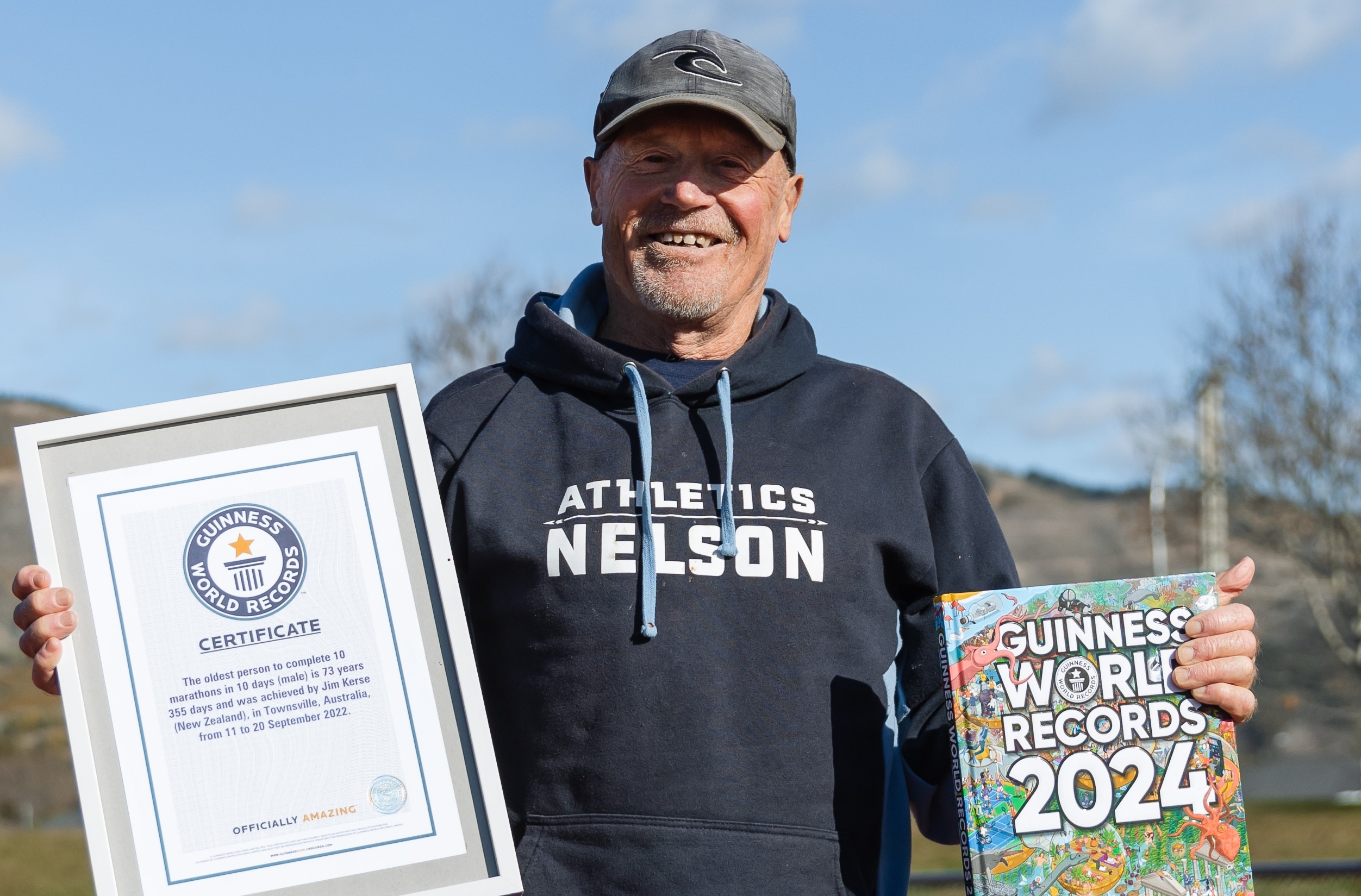50-plus runners rack up the kms


Jim Kerse entered the Guinness Book of World Records when – aged 73 years and 355 days – he became the oldest man to run 10 marathons in 10 consecutive days. Photo: Tessa Claus.
Recreational running has always been a popular activity in Nelson, with its vast array of roads, tracks, trails, hills, and mountains. Inevitably, smaller, more social runs often lead to longer and more competitive runs for some. Justin Eade talks to a few runners with serious credentials and finds out some of the challenges they’ve pushed through, where they run, and why they love running so much.
Jacquie Boer, 54, a PR consultant

Jacquie first got into running when she was 49, as she wanted to do a 10k run before turning 50. But then lockdown happened. Undeterred, Jacquie registered for a run, got sponsorship, and did a 10k run around her back lawn – 162 laps of it to be precise. Starting running was a long-cherished dream for Jacquie and a huge achievement. She lost a lot of weight (nearly 40kg at one stage), and her big dream was to walk up a hill without puffing and to run a long distance. As she was finishing her first half marathon, she stopped and had a cry at having finally done the long run she'd always dreamt of.
Jacquie’s now done two marathons and 10 half marathons, and recently did a 10k run in Florence, Italy, on her honeymoon. “That shows how committed I am to running,” she says.
Jacquie’s favourite run is out to the beach from town, but she also thinks the Great Taste Trail is wonderful. Usually in a week she tries to do about 20km – a beach run two or three times, then one longer run with a hill.
Jacquie likes running on her own, but also socially with the Waimea Harriers Club and Athletics Nelson when they do events. “I’ve made some wonderful friends through running, and I find runners very non-judgmental and welcoming… lovely people.”
Last year in winter, Jacquie made headlines when she went for a run in St Arnaud. Instead of being out for an hour, she got lost and was out overnight in the bush. She wouldn’t recommend that as a running experience, but having done two marathons by then, she knew what being uncomfortable was like, and says that helped her when she was out there all night by herself. She remained calm, and despite Search and Rescue being deployed, she walked out under her own steam the next morning.
Jacquie says the social side of running is a real bonus, although conversations tend to be about the runs people have done, the runs they’re going to do, and the runs they dream of doing.
She says the best thing about running is mental wellbeing. “I like to run at the end of my workday and clear my head… it makes me feel good… it makes me feel proud of myself for getting out there and doing it.” And it’s also good for her health physically, so Jacquie wants to keep running for as long as she can.
Mike Ward, 82, artist

Mike first got into running when he was at secondary school, and wasn’t a bad runner, though cycling also loomed large in those years. He came back to running after ten years off at thirtyish and started racing a year or two later.
Mike has run in the hills around Nelson ever since he retired from teaching 46 years ago. Some favourites are Thomas’ Road, Bob’s Fern Road, Ridge Road, then back along the tops and down Kaka Hill, or out along Bay View Road to the Botanics, and back into the middle of town. “If I could still do that, that’s where I’d be running,” he says. He also rates the uphill mountain-bike trail onto Fireball Road off the Maitai, and then returning to the city via Jack’s Track. “You never get tired of coming back down Jack’s Track and there’s the city and the Bay out in front of you.”
Mike’s done 30 Coast to Coasts, and one across Scotland, so that’s 31 really. Other memorable events have been the North Cape to Bluff, and the Xerox Challenge in 1990, so Mike has pushed himself to the limit and had some pretty unique experiences.
These days, Mike’s routine is a club run on Saturday for an hour or two, maybe two hours on a Sunday walking and running, then two or three times in the morning during the week. He usually gets up around 6am and walks and runs… maybe six or seven kilometers on a good day. Normally there would be hills, but these days he tends to keep to the flat.
Mike says running is important physically, emotionally, and mentally. If you’re physically fit, then you can handle other things, but the most important thing is probably the head space. “I’m thinking of all the times when I had a speech to write, or something was getting me down and you go for a run and suddenly the speech writes itself or you’ve figured out what to do about your problem. There’s also the joy of taking groups out and coming to a place you’ve seen many times, and now getting to see it through their eyes.”
As for how long Mike will keep running, he knows it gets harder as you get older, but he’d like to keep going and has been remarkably injury-free for most of his running career. When he has had an injury, the best solution has been to run through it. And if you can’t run, walk… until you can run again.
Jim Kerse, 75, retired physical education teacher

Jim always enjoyed running for rugby training, and ran on never-ending farm paddocks around Tapanui, Otago, from the age of 15. He started running marathons in 1977 at age 29 and finds the satisfaction of sweating and being a little out of breath, in combination with being in nature, absolutely priceless.
Jim has run 104 marathons, 60 ultra marathons, and has done 10 Ironman competitions along with five Coast to Coasts. In 2022, the Guinness Book of World Records acknowledged Jim – aged 73 years and 355 days – as the oldest man to run 10 marathons in 10 consecutive days.
Jim’s normal routine is 30-80km per week, interspersed with paddleboarding. He does a mixture of hills and flat running but uses hills more when training for a specific event, such as the Motatapu Marathon. Favourite tracks include the circumference of Saxton Field, the Upper Ngawhatu Valley, Tahunanui Beach to Monaco, and Barnicoat Road to where the paragliders take off.
Jim says he’s enjoyed all the events he’s taken part in, but his favourites feature wide open tussock or green rolling hills. Examples being the Motatapu (Wanaka to Arrowtown), the Northburn 100 (Dunstan Mountains by Cromwell), the Big Easy (Cross Country snow farm at Cardrona to Clutha River) and Challenge Kuriwao (steep farming country near Clinton). “I’m a bit biased, all these runs are in Otago,” he says.
When Jim was trying to better his times in the 80s, he liked running with others for improvement, but nowadays he’s quite happy to run on his own… “It’s sort of a Zen-like experience.” Jim says he’ll always be active, but in a year or so he plans to tone down the endurance runs to focus on other aspects of fitness, like strength, agility, skill, and even speed! “I hope to do a lot of this at the beach,” he says.
Yvonne West, 72, retired teacher

Yvonne took up running at the age of 35 because, with young children then, she found it difficult to continue with the team sports she’d been playing.
Over her 30 years of competitive running, in addition to many shorter races, Yvonne has completed over 80 half marathons, 20 full marathons, and about 40 major off-road events, ranging from 25km to ultra marathons.
Yvonne recently had a major health event which has curtailed her running somewhat, but ironically, she credits running with saving her life. “Thanks to my running and reading my body well, I saved a possible heart attack.” She has a congenital bicuspid aortic heart valve and, noticing she was slowing down in recent years, she went for tests and was advised she’d need open-heart surgery and a valve replacement. That happened 11 months ago, and she got back into running four months after surgery. She says that although she’s slower now compared to her earlier days, she’s starting to get it back.
When Yvonne was running seriously, the Kepler Track was her favourite, followed by the Abel Tasman and then the Dun Mountain Trail. She followed an Arthur Lydiard training programme six days a week, which included long hill runs, speed work, shorter flat runs, and races varying from 5km to ultra marathons. The Kepler Challenge Ultra Marathon Race was her most memorable event, having completed it 10 times and winning the 50+ age group eight times. The Buller Marathon was her favourite road marathon, winning her age group six times, and posting her fastest marathon time of three hours and 12 minutes.
Yvonne says that physical fitness through running has always been important to her. “I had very few sick days in all my years of teaching and enjoyed the feeling of wellbeing and high energy levels.”
At times, her teaching was emotionally very draining, and the stress release which came from running after school was invaluable. Because she values running so much, she plans to continue as long as she possibly can. “I am very grateful to be alive and still able to run, walk, and bike every day.”
